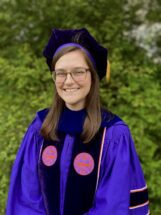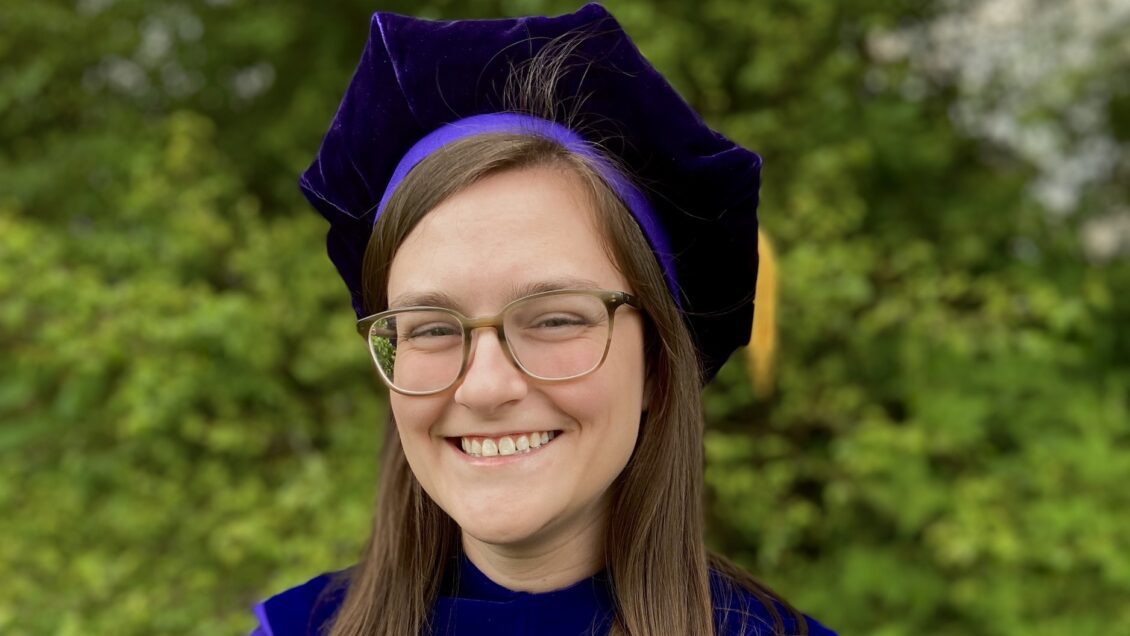The following reflection was written by Catherine Kenyon, who recently received her Ph.D. in engineering and science education after studying under Clemson University’s Dr. Lisa Benson. Kenyon also holds a Bachelor of Science and Master of Science in mathematical and statistical sciences, both from Clemson, and she has served as a lecturer in the Department of Mathematical and Statistical Sciences.

Once, I was sitting in a graduate student seminar when the speaker decided to drive home their opinion, “You should never get all three of your degrees from the same university.”
Well…oops! This spring, I, along with several other graduates, became Triple Tigers— earning our third degree from the same university, Clemson University. However, all spring 2023 doctoral graduates, despite where their previous degrees were from, can agree that this season holds a special and unique feeling.
In finishing the doctoral studies and graduating, the moment is special because we have finally reached an outcome for the work we’ve put in and the sacrifices we’ve made over the past few years. That’s what I believe many don’t realize factors into earning a doctoral degree— the things we’ve had to give up or temporarily place to the side to pursue this goal. Many doctoral graduates have sacrificed years of their lives, travel opportunities, precious family time, holiday celebrations, and, at times, even their sanity for the sake of this degree.
So why did we choose this path? Why did we decide that these obstacles and sacrifices were worth it? In classic graduate student fashion, I decided to collect data from fellow doctoral awardees to find answers to these questions.
Jacob Biddlecom, also a Triple Tiger, says that he initially didn’t plan on pursuing a Ph.D. However, the people and culture of Clemson pushed him “to do more and think in different ways than [he] ever thought [he] would.” This doctoral experience “taught [him] how to look at the world through a different lens.”
Emily Doherty revealed that the pursuit of her doctorate in applied health research and evaluation had immersed her in a “community of curiosity and learning” and thus shaped her to be a “better health scientist and contribute meaningfully” to her field.
Dehao Qin had the opportunity to work on projects for NASA and the Department of Energy during his graduate studies in electrical and computer engineering while at Clemson. Through these experiences, he’s felt that he has “advanced human technology” and, as a result, has made his “existence more meaningful.”
For myself, this doctoral experience has been worth all the internal debates and sleepless nights because it showed me the value of exploration. I’ve been at Clemson for 10 years now, and if I’ve figured out anything about myself during my time here, it’s that I truly believe that asking questions, exploring answers, and staying curious are the keys to progress.
The descriptions of why these doctoral degrees were worth the struggles and obstacles we faced are connected by a common theme: We think differently in a way that fuels us for meaningful change and progress.; we have been transformed into world-changers.
If anyone takes a glance at the titles of Clemson’s doctoral graduates’ dissertations, they might find themselves in the same position as me — reading about remarkable topics that they don’t understand. However, I can assure them that the work performed by these phenomenal doctoral students plays a part in changing the world. How incredibly honored I am to be connected to these graduates.
Go Tigers!
Get in touch and we will connect you with the author or another expert.
Or email us at news@clemson.edu

